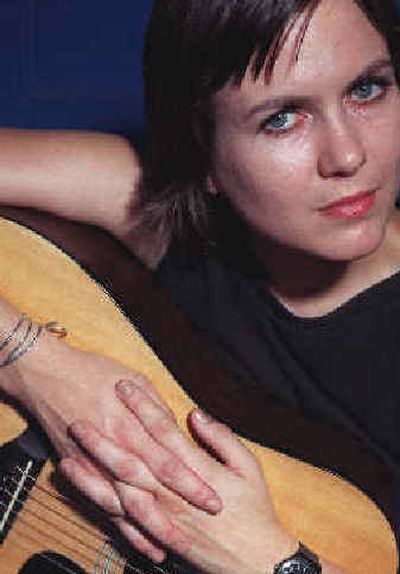Digging deeper

It’s an uncomfortable predicament for a singer and songwriter when she doesn’t care much for the songs she writes or the way she sings them.
Consider Juliana Hatfield, for example. On a series of albums she released in the ‘90s, she found herself writing indie guitar-pop songs, a style that she says didn’t really match her own musical taste.
“It felt like a curse,” Hatfield says softly, fiddling with the straw in her cup of iced tea. “Not a curse that I had to write music, but that the music I created was not the kind of music that I would ever really choose to listen to. I like rock music more than I like pop music, and I don’t generally like singers with cute voices. But I can’t help the voice I have.”
“Cute” in this case is a pejorative for Hatfield, who idolizes the tough-guy rock ‘n’ roll grit of singers such as Paul Westerberg.
Her new album, “In Exile Deo,” is unmistakably a rock album. The record features Hatfield, 37, rejoicing in the sounds of turned-up guitars from the start of the opening track, “Get in Line.”
Well, maybe “rejoicing” isn’t quite the right word. Never celebratory, her forthright lyrics on “In Exile Deo” tackle tough, often self-revelatory themes. It’s a form of therapy, she says.
“I’ve always written about relationship problems, and self-esteem problems and self-hatred and stuff like that,” she says. “But this time, I’m trying to go deeper and find the roots of these problems and maybe actually change them.”
On the driving rocker “Sunshine,” for example, Hatfield sings: “I’ve been sleeping through my life/Now I’m waking up and I want to stand in the sunshine.”
Not all the tunes are so uplifting, however. The sorrowful ballad “Singing in the Shower” describes a lonely man whose dreams never make it out from under the nozzle’s comforting stream.
“That song is like a warning to myself,” she says. “I have sympathy and empathy for that guy, because I don’t want to end up like that. A lot of this record is me looking at my life… . Am I going to let it continue the way it’s going, or am I going to take hold of it and try to change it and make it better?”
“In Exile Deo” is certainly the work of a more assured artist. Where her earlier material would occasionally sound self-conscious, the new songs seem effortless. The immensely catchy “Some Rainy Sunday” is a calm examination of a relationship’s end and the mixed blessings therein. The raucous “Dirty Dog” shows dark humor as the narrator outlines the thoughtless misdeeds she’ll tolerate before telling her tormenter, “enough.”
“I am more self-confident,” Hatfield says. “That’s not saying much, because I started off in a place where I had no confidence. The whole ‘90s, I pretty much had no confidence. I’m just feeling a lot better. I’m feeling more capable about my abilities.”
Part of her self-doubt in the ‘90s stemmed from having to find her own way after leaving the Blake Babies, the band she started in 1986 while attending the Berklee College of Music in Boston.
Soon afterward, she contributed lyrics to a solo album by Bangles singer Susanna Hoffs. Hatfield’s 1992 solo debut, “Hey Babe,” earned her a major-label deal with Atlantic, and later records won critical praise and landed her songs on the radio and on movie soundtracks, including “Reality Bites,” and TV shows, including “My So Called Life.”
She has also recorded with the Lemonheads, Hoffs, Mary Lou Lord and Aimee Mann, for whom she sang background vocals on two of her albums.
“When I had the most success, when I was selling the most records, I didn’t feel like I deserved it. I still feel like I didn’t deserve it,” Hatfield says. “I feel like I haven’t reached a point where I can say, ‘I’ve made it. I’ve succeeded. I’m completely content.’ ”
Will she ever reach that point? “No,” she says without hesitation.